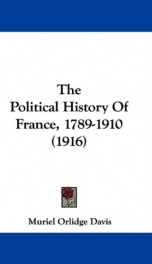the political history of france 1789 1910

Purchase of this book includes free trial access to www.million-books.com where you can read more than a million books for free. This is an OCR edition with typos. Excerpt from book: CHAPTER III THE LEGISLATIVE ASSEMBLY AND THE CONVENTION When the Constituent Assembly disbanded, it was generally hoped in France that, its work at last being finished, the long-looked-for era of peace and prosperity would begin, and that this would be secured by a new Assembly keeping the much desired Constitution working. But, alas for such aspirations, the life of the new Legislative Assembly was short and stormy. It met on October 1, 1791 ; it came to an end in September 1792. In less than a year France had been disabused of her hopes of the Golden Age. A great increase of misery and unrest had come upon the country, and there must have been few who were not filled with forebodings for the future. Enthusiasm for the ideals of the Revolution had blinded the French people to facts which now seem to us glaringly qbvious, and which from the first doomed the Legislative Assembly to failure. For instance, as we saw in the last chapter, all members of the Constituent Assembly were excluded. The deputies of the new Assembly were men who had all their experience to learn ; the bitter wranglings and contentions of the National Assembly were certain to recur. Furthermore, not only was experience denied an entry but the waywas also barred to many men of honest convictions; for in order to qualify as a deputy it was necessary to take the civic oath, which, among other things, implied acquiescence in the Civil Constitution of the clergy. Now many orthodox Catholics were unwilling to take this oath; thus, this condition automatically eliminated those who were honest enough to stand by their convictions. These two difficulties arose from bad legislation. There was another cause which made it also highly improbable that the Assembly would be moderate in tone, or that it would be o... --This text refers to an alternate Paperback edition.
Info about the book
Author:
Series:
Unknown
ISBN:
0300099797
Rating:
4.5/5 (4)Your rating:
0/5
Languge:
English
Users who have this book
Users who want this book
What readers are saying
What do you think? Write your own comment on this book!
write a commentif you like the political history of france 1789 1910 try:
Other books by this author
Do you want to exchange books? It’s EASY!
Get registered and find other users who want to give their favourite books to good hands!


